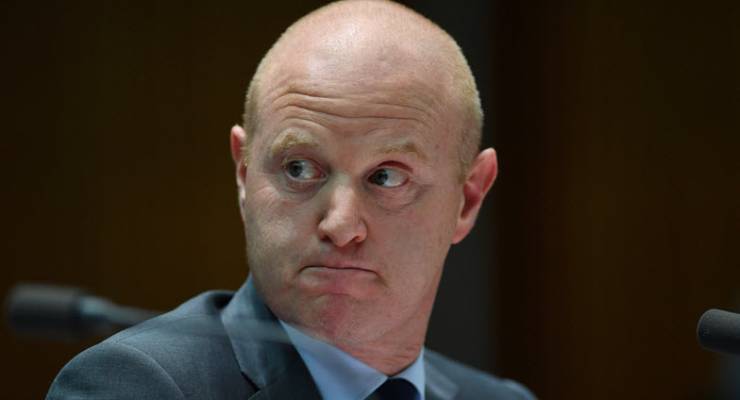
CBA CEO Ian Narev
The Australian Prudential Regulation Authority is to establish “an independent prudential inquiry into the Commonwealth Bank of Australia (CBA) focusing on governance, culture and accountability frameworks and practices within the group”, it announced this morning. A panel picked by APRA, working to a terms of reference yet to be finalised, is supposed to report within six months of commencing work. It will consider would “at a minimum … whether the group’s organisational structure, governance, financial objectives, remuneration and accountability frameworks are conflicting with sound risk management and compliance outcomes”.
The big banks have long denied any “cultural” problems, despite a litany of scandals involving all four big banks. Ever since the CBA money laundering scandal broke, CEO Ian Narev has been adamantly insisting there is no cultural problem within the bank, although he grudgingly admitted the CBA’s culture might not have been “perfect”. Now, CBA chair Catherine Livingstone has “welcomed” the inquiry and promised full co-operation.
[CommBank can’t spin its way out of money laundering crisis]
There are reasons to be sceptical about the inquiry. For a start, APRA’s own oversight of the CBA, and that of ASIC, AUSTRAC and the Reserve Bank, should be the subject of the inquiry as well. Banks don’t only develop cultures internally — the regulators that oversee them play a role in those cultures in relation to what is seen as acceptable and not acceptable. It’s also problematic that the inquiry will likely be held in camera, even though the report will be made public. The bank will meet the cost of the inquiry, which risks raising questions about its independence.
The inquiry won’t specifically address any of the range of scandals in which the CBA is currently involved, including, most problematically, the money-laundering scandal. This is a huge omission, given the AUSTRAC allegations suggest a conjunction of major management, board and regulatory failings. There are serious questions about the performance of the CBA board under former chair David Turner and Livingstone. Livingstone joined the CBA board in March of 2016 and became chair at the start of 2017. Earlier this month, she said the bank had known of the AUSTRAC claims since “late in 2015”; the bank failed to disclose the claims in 2016, after she became chair. In fact, remarkably, Livingstone — who has been portrayed as the new broom sweeping through the scandal-prone bank — met with Greg Medcraft of ASIC not long before the AUSTRAC claims were filed and failed to mention them to him.
[Yes, we need a bloody banking royal commission]
Livingstone’s response to the inquiry was to recognise that “events over recent years have weakened the community’s trust in us. We have been working hard to strengthen trust, and will continue to do so. We welcome this opportunity for independent parties to review the work we have already undertaken and advise on what more we can do. APRA’s oversight of this inquiry will ensure the independence and transparency needed to reassure all our stakeholders.”
This suggests that the inquiry has been sorted out well ahead of time with the CBA (and presumably the Reserve Bank, ASIC, Treasury and the Treasurer’s office), when ideally APRA would have hit an errant institution with an inquiry without forewarning — just to make the point that this will be truly independent.
But even if the inquiry is a genteel exploration of CBA systems rather than the judicial investigation the place needs, it further undermines what’s left of the tattered credibility of the Business Council of Australia. The BCA is chaired by Grant King, a bloke who had to resign from the BHP board because investors didn’t like his record of wealth destruction. And he replaced Livingstone as BCA chair. On the board next to King is Ian Narev, whose bank is now being investigated for major cultural and accountability problems.
Not, of course, that that that will stop the BCA lecturing the rest of us about the need for wages cuts, emasculation of unions and lower company taxes.








At least with APRA taking another look at what they’ve missed, when they were supposed to be overseeing these sort of things, they’ll be able to downplay their own shortcomings – and verify Morrison’s commentary.
As he says (to paraphrase) “Why have a royal commission that will take three years to grind the truth, shake the truth out and come to a conclusion : when we can ahve another go procrastinating yet again, come to some feel-good “findings” and then hunker down to wait for the cycle to repeat itself and screw more rubes over, so they can get back to those profits?”
….. I wonder how much these banks are “donating” to the Limited News Party for this sort of protection?
I recall the Fitzgerald Inquiry into corruption in Queensland. Fitzgerald recommended that all police from sergeant and above be replaced. Of course it did not happen.
Is the CBA in the same situation with every supervisor compromised or worse?
Beyond a certain size, any organisation that is threatened cannot question its existence and when a problem becomes unignorable (usually due to external pressure) the chances of the upper echelon staff being held accountable are slim.
If anything results from an enquiry, it is usually that the tea lady dunnit.